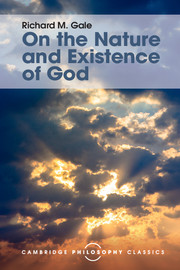Summary
This book addresses the question whether there is rational justification to believe that God, as conceived of by traditional Western theism, exists. There are contemporary fideists who hold that there is no need to justify belief by appeal to arguments, since the mere fact of belief is supposed to be self-justificatory. There is no inconsistency in offering both a fideistic and an argumentative support of belief, as do some contemporaries. My concern is only with the latter part of their justification. The question, then, is whether there are any good arguments either for or against believing that God exists.
I do not pretend to answer this question, since I completely ignore inductive arguments based on design, beauty, and lawlike regularity and simplicity for the existence of God, as well as those based on evil to show the improbability of his existence. A proper discussion of these arguments is the topic for a separate book of considerable length, since it would have to deal with the applicability of Bayesian models of probability to the aggregation of the premises of all the different inductive arguments for and against God's existence. One of the valuable lessons to be learned from Richard Swinburne's The Existence of God, which makes out such a Bayesian case for belief, is that the issues are exceedingly complex and need to be treated by those who are steeped in probability and confirmation theory, which eliminates me.
Our question whether there are any good arguments either for or against belief takes on special importance in the light of the startling resurgence of theism within philosophy during the past thirty or so years. What might surprise some is that the three leaders of this movement, William Alston, Alvin Plantinga, and Richard Swinburne, are themselves analytical philosophers. Some mistakenly see analytic philosophy as the natural enemy of theism, no doubt because certain movements in twentieth-century analytic philosophy, such as logical atomism, logical positivism, and some versions of ordinary language philosophy, developed theories of meaning that were employed to slay the dragon of theism by showing that it did not measure up to certain minimal standards of meaningfulness. But it is a mistake to identify analytic philosophy with these movements and their dogmas.
- Type
- Chapter
- Information
- On the Nature and Existence of God , pp. 1 - 10Publisher: Cambridge University PressPrint publication year: 2016

